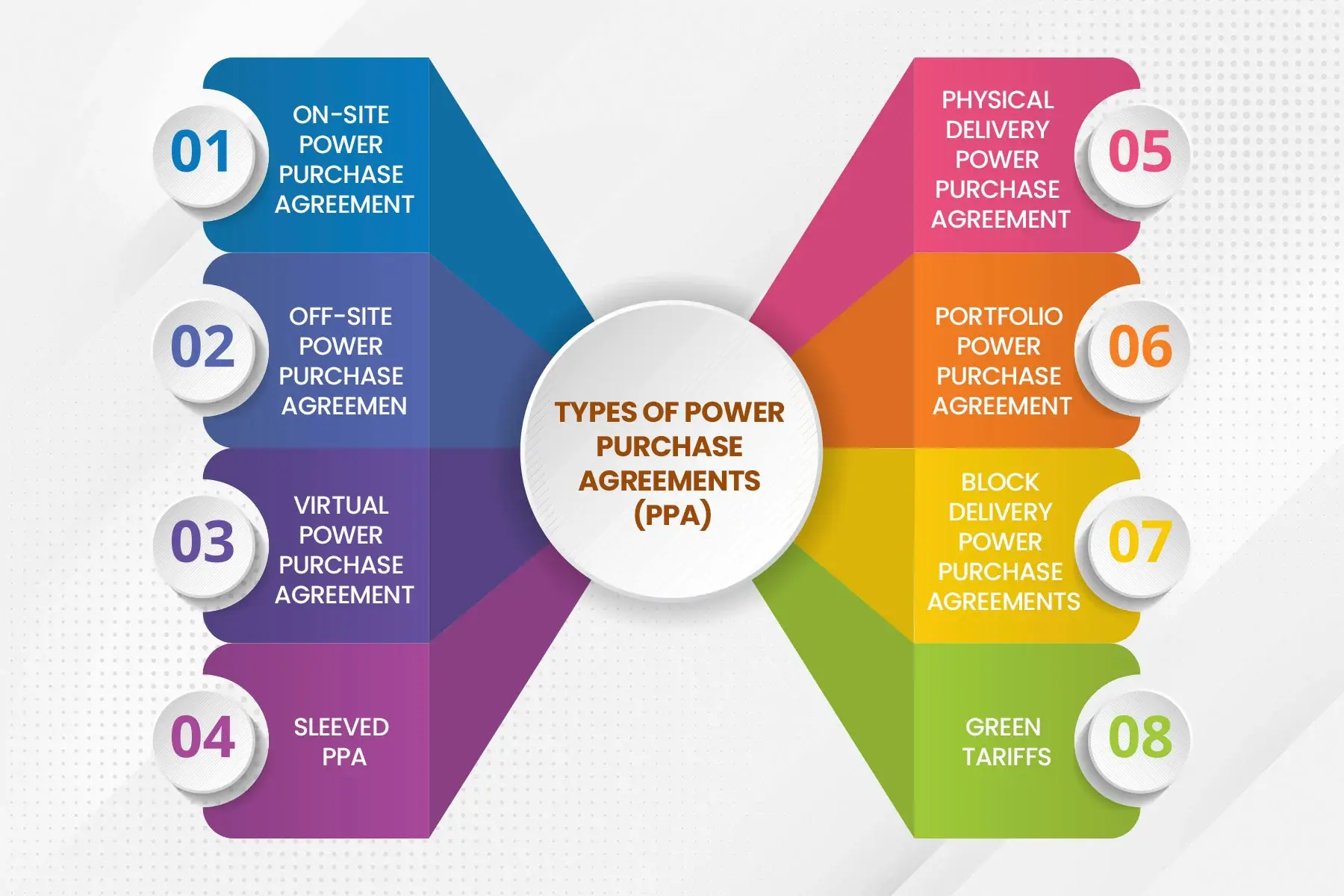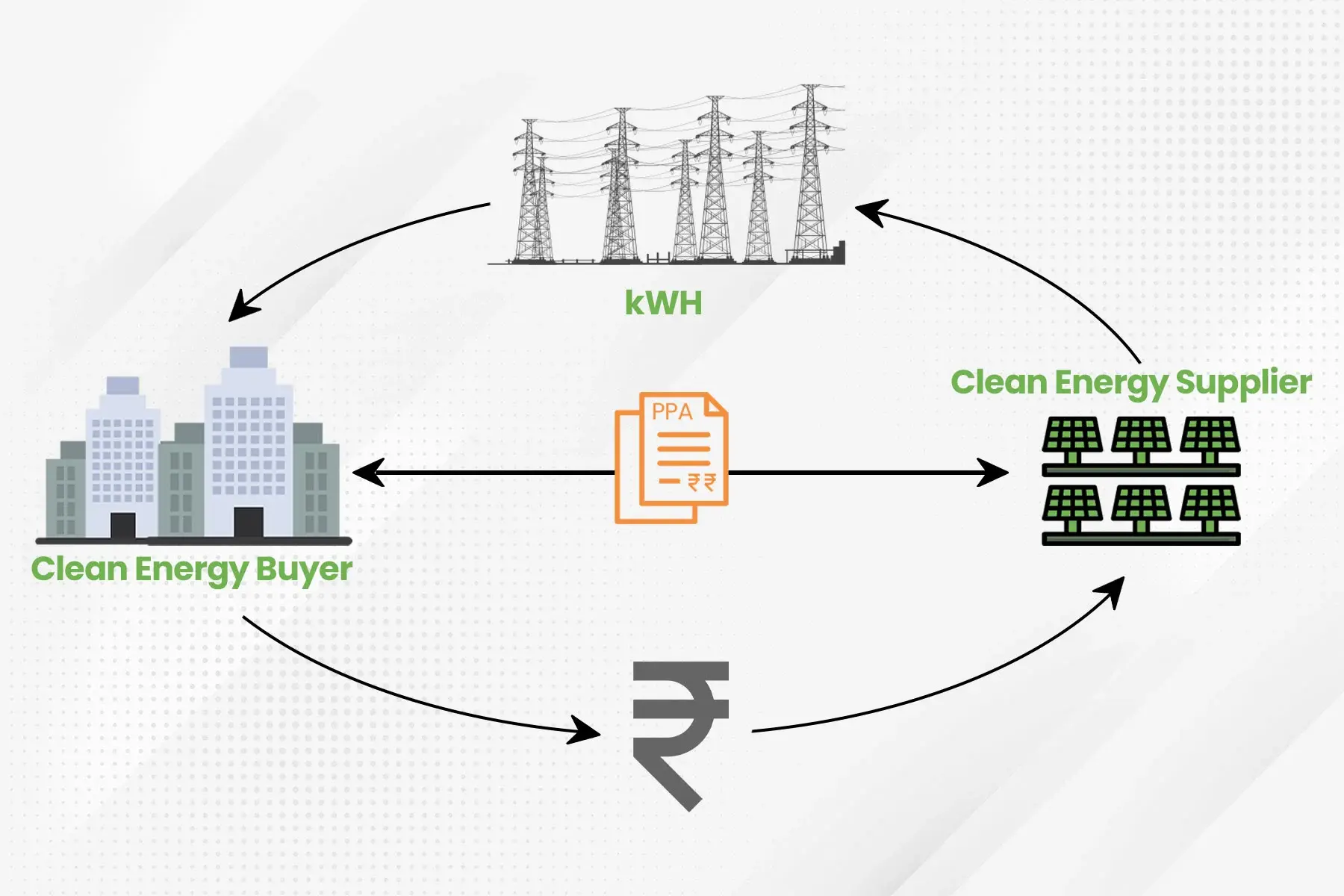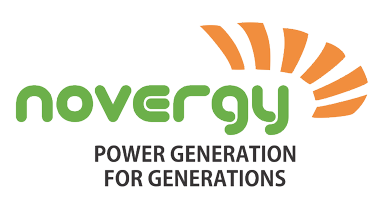Power Purchase Agreements (PPAs) have become essential tools in the ever-changing energy procurement landscape for companies looking to ensure a reliable and affordable energy supply.
Enterprises must have a basic understanding of PPAs to make well-informed decisions regarding their energy procurement strategies.
We’ll go over the fundamentals of PPAs in this blog, look at the many kinds, and assist you in choosing the one that best fits your requirements.
Essentials of Power Purchase Agreements:
An official contract between a seller and a buyer, known as a Power Purchase Agreement (PPA), commits the buyer to purchase a certain amount of electricity over a predetermined period.
Establishing a steady and predictable income source for both parties is the main objective of a PPA.
In addition to providing financial security, this is essential for fostering the expansion of renewable energy projects and proactively promoting a more ecologically conscious and sustainable future.
Why PPAs?
There are many benefits associated with PPAs, such as long-term pricing stability, reduced risk, and an emphasis on environmental sustainability.
By guaranteeing stable or index-linked power costs, companies actively support renewable energy projects, protecting their environmental goals while also shielding themselves from the whims of market volatility.
This two-fold purpose highlights the company’s dedication to a more environmentally friendly future while also bolstering financial stability.
Types of Power Purchase Agreements (PPA):

1. On-Site Power Purchase Agreement:
- On-site PPAs offer businesses the opportunity to harness renewable energy directly at their facility, reducing reliance on traditional grid electricity.
- By generating energy on-site, businesses can offset their electricity costs and potentially achieve significant long-term savings.
- On-site PPAs typically involve the installation of solar panels or other renewable energy systems, which can be tailored to meet the specific energy needs of the buyer.
- Novergy specializes in providing comprehensive solar energy solutions for various sectors, including commercial, industrial, and residential applications.
- With years of experience and expertise in the solar industry, Novergy offers innovative and reliable solar technology to help businesses transition to cleaner energy sources. Novergy’s commitment to quality, reliability, and customer satisfaction makes them a trusted partner for businesses seeking effective and sustainable solar energy solutions.
- Novergy’s solar solutions are designed to maximize energy efficiency and minimize environmental impact, making them ideal for organizations looking to reduce their carbon footprint.
- In addition to on-site PPAs, Novergy also offers a range of other solar energy solutions, including rooftop solar installations, solar lighting systems, and solar pumping solutions.
2. Off-Site Power Purchase Agreement:
- Off-site PPAs enable businesses to access renewable energy from external projects located off their premises.
- These projects can include large-scale solar or wind farms developed by renewable energy companies or utility providers.
- Off-site PPAs offer businesses flexibility and scalability in meeting their renewable energy goals, as they are not limited by on-site infrastructure or location constraints.
- Businesses can enter into long-term contracts with renewable energy providers to purchase a predetermined amount of electricity at a fixed price over a specified period.
- Off-site PPAs allow businesses to benefit from renewable energy without the need for upfront capital investment in infrastructure or ongoing maintenance costs.
- By sourcing electricity from external renewable energy projects, businesses can reduce their carbon footprint and demonstrate their commitment to sustainability.
3. Virtual Power Purchase Agreement – VPPA (also Synthetic PPAs):
- Virtual Power Purchase Agreement (VPPA) allows organizations to purchase the environmental attributes of renewable energy generation without physically receiving the electricity.
- VPPAs enable organizations to support renewable projects and achieve sustainability goals without the need for direct onsite or offsite consumption of renewable energy.
- VPPAs offer environmental benefits and help mitigate risks associated with traditional energy sources.
- Challenges associated with VPPAs include market fluctuations, project delays, and regulatory changes, which can impact the financial and operational aspects of the agreement.
- Conducting a thorough risk assessment is crucial before entering into a VPPA to ensure alignment with the organization’s goals and risk tolerance.
- Despite challenges, VPPAs present an opportunity for organizations to contribute to the growth of renewable energy while advancing their sustainability objectives.

4. Sleeved PPA:
- A sleeved PPA utilizes a third-party intermediary, known as a “sleeve,” to facilitate the physical delivery of electricity from a renewable project to the buyer.
- This intermediary helps businesses navigate regulatory complexities and ensures a reliable power supply from renewable projects.
- In a sleeved PPA arrangement, the sleeve acts as a bridge between the renewable project and the buyer, managing the physical delivery of electricity while the buyer benefits from renewable energy without directly engaging in energy transactions.
- Sleeved PPAs provide businesses with a streamlined approach to accessing renewable energy, reducing administrative burden and ensuring compliance with regulatory requirements.
- By leveraging the expertise of the sleeve, businesses can effectively integrate renewable energy into their energy portfolio while minimizing risks and maximizing the benefits of clean energy adoption.
- Sleeved PPAs offer a flexible and efficient solution for businesses seeking to meet their sustainability goals and reduce their environmental impact through renewable energy procurement.
5. Physical Delivery Power Purchase Agreement:
- In a physical delivery PPA, the buyer directly receives the electricity produced by a renewable energy project.
- This arrangement entails straightforward ownership of the power and its associated attributes by the buyer.
- Physical delivery PPAs provide a clear and direct method for businesses to procure renewable energy and integrate it into their energy portfolio.
- By receiving actual electricity from the renewable energy project, the buyer benefits from the environmental attributes of renewable energy while supporting sustainable energy generation.
- Physical delivery PPAs offer transparency and accountability in renewable energy procurement, ensuring that the buyer receives the expected energy output from the project.
- This type of PPA enables businesses to demonstrate their commitment to sustainability by directly sourcing renewable energy for their operations.
6. Portfolio Power Purchase Agreement:
- A portfolio PPA aggregates multiple renewable energy projects to fulfill the buyer’s energy requirements.
- This approach offers diversification by spreading the buyer’s energy sourcing across various projects, reducing exposure to risks associated with individual projects.
- Portfolio PPAs allow buyers to access a mix of renewable energy sources, such as solar, wind, or hydroelectric power, optimizing energy generation potential.
- By combining multiple projects, portfolio PPAs can offer greater reliability and stability in energy supply, even in cases of fluctuations or downtime in specific projects.
- This type of PPA provides flexibility for buyers to tailor their energy procurement strategy according to their needs and preferences, optimizing cost-effectiveness and sustainability.
- Portfolio PPAs contribute to the growth of renewable energy by creating economies of scale and incentivizing investment in a diverse range of renewable projects.
7. Block Delivery Power Purchase Agreements:
- Block delivery PPAs enable buyers to purchase energy in predetermined blocks or increments, offering flexibility in meeting fluctuating energy demands.
- This approach allows buyers to adjust their energy procurement according to their specific needs and consumption patterns, ensuring efficient utilization of resources.
- By procuring energy in blocks, buyers can effectively manage costs and budgetary constraints, optimizing financial performance.
- Block delivery PPAs provide transparency and predictability in energy pricing, allowing buyers to plan and forecast expenses more accurately.
- This type of PPA offers a structured approach to energy procurement, facilitating better risk management and mitigation strategies for buyers.
- Block-delivery PPAs promote sustainability by enabling buyers to support renewable energy projects while maintaining control over their energy supply and costs.
8. Green Tariffs:
- Green Tariff 1.0 and Green Tariff 2.0 are utility-sponsored programs that allow customers to purchase renewable energy directly from the grid.
- Green Tariff 1.0 typically involves the purchase of renewable energy certificates (RECs) or offsets, allowing customers to support renewable energy projects without directly accessing renewable electricity.
- Green Tariff 2.0 offers customers the opportunity to directly purchase renewable electricity generated from specific renewable energy projects, such as wind or solar farms, through their utility provider.
- While Green Tariff 1.0 focuses on supporting renewable energy projects indirectly, Green Tariff 2.0 provides customers with the option to directly access and consume renewable electricity, promoting greater transparency and accountability in energy sourcing.
-
Differences Between Sleeved PPA and Virtual PPA
In a sleeved PPA, the third-party intermediary facilitates the physical delivery of electricity from the renewable energy project to the buyer, ensuring direct consumption of the power. On the other hand, a virtual PPA focuses solely on purchasing the environmental attributes associated with renewable energy generation, such as Renewable Energy Certificates (RECs), without physically receiving or consuming the electricity. This distinction allows businesses to choose between direct energy procurement or supporting renewable projects indirectly.
-
Differences Between PPA and Prepaid PPA
A prepaid PPA offers a unique approach to energy procurement by requiring upfront payment for electricity, providing financial advantages and minimizing exposure to market volatility. In contrast to traditional PPAs, where payments are spread out over the contract duration, prepaid PPAs offer immediate cost savings and budget certainty. This innovative structure allows buyers to secure energy at a fixed price upfront, mitigating risks associated with fluctuating energy prices and enhancing financial predictability throughout the contract term.
-
Differences Between PPA and Lease
A Power Purchase Agreement (PPA) entails the purchase of electricity generated by renewable energy infrastructure, providing a reliable source of power without ownership of the infrastructure. Conversely, a lease grants access to renewable energy infrastructure, such as solar panels or wind turbines, without the obligation of ownership. Leases are often utilized in on-site installations, offering businesses and individuals an alternative to traditional PPAs. This arrangement allows for the utilization of renewable energy while minimizing upfront costs and maintenance responsibilities.
Conclusion:
In conclusion, the wide range of Power Purchase Agreements (PPAs) provides businesses with the flexibility to achieve their energy objectives effectively. Understanding the distinctions among different PPA types is vital for making well-informed decisions. The growing popularity of virtual power purchase agreements underscores a significant trend in sustainable energy procurement, offering organizations a means to support renewable projects and advance toward a cleaner future. When navigating the landscape of PPAs, it’s essential to consider your organization’s unique needs, risk tolerance, and sustainability goals to select the most suitable option for your energy procurement strategy.
As we collectively strive for a sustainable future, every individual has a role to play in driving positive change. Whether through adopting solar solutions for businesses or advocating for solar policies in industries, each action contributes to building a more resilient and environmentally friendly world.
Novergy offers a compelling choice for industries seeking sustainable and efficient energy solar solutions. Contact us at solar@novergy.net for more information.

